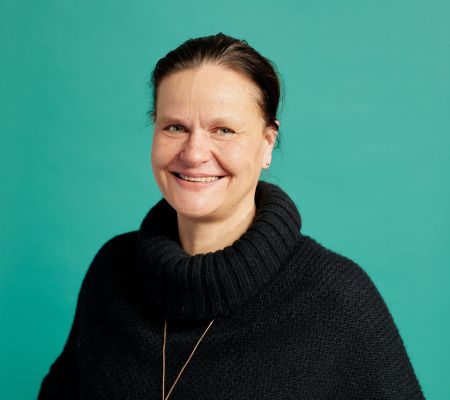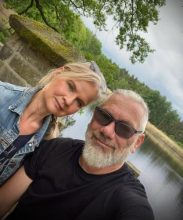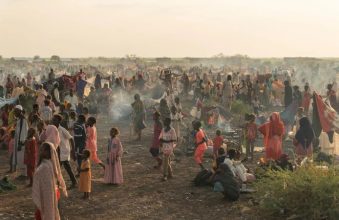By Hassan Humeida
Kiel, Germany
As Germany commemorates 35 years of unity since the historic fall of the Berlin Wall, AsiaN is publishing a special series of interviews with Germans who reflect on the country’s path to reunification. These accounts capture the experiences of individuals who witnessed the effects of breaking down barriers and opening doors to a shared future.
The reflections, marked by fairness and authenticity, highlight themes of dignity, resilience and hope. They move beyond surface narratives to offer deeper perspectives on the significance of reunification for Germany and for the world.
In keeping with its mission to present journalism grounded in shared humanity, AsiaN is committed to sharing these stories with readers across Asia and well beyond it.
Through these voices and their enduring messages, AsiaN seeks to remind the world that reconciliation, unity, and the bridging of divides are achievable ideals in today’s world.

My peace is inextricably dependent on the peace of everyone else
Interview with Daniela Suhr – 54 years old; State Administrator; Kiel, (West) Germany
My own experiences as a young person before the German reunification
As a young woman in Kiel, my life before 1990 was shaped by the sea and the constant presence of the navy during the Cold War. Although the GDR border was close, it felt distant.
I was well aware of the contrast between my free, carefree life with consumer opportunities and freedom of expression and the lack of freedom of the people in the “other Germany.” The division of Germany was an everyday reality for me, but reunification was unimaginable until it happened.
My feelings during the German reunification process
When the Wall fell, I was at first stunned, then overwhelmed with joy with the end of the division and the newfound freedom of the people in the East.
My first encounters with GDR citizens who came to Kiel in their Trabbis (Trabant=Cars from GDR) were a strange mixture of strangeness and immediate connection. Alongside the euphoria, I also felt the anxiety about the financial burdens of reunification that would fall on us young people.
Despite everything, it was a deeply moving, historic moment to witness Germany coming together again-an event I could never have imagined.
How my life and society have changed in the last three decades
Looking back on the last 30 years feels like glimpsing another life that has transformed my soul.
The digital flood has replaced my former, tangible life with an often-overwhelming flood of information, leaving a longing for simplicity. At the same time, my hometown of Kiel has transformed: The raw pulse of the shipyards has given way to a younger, more international rhythm with a lot of tourism – a change I find beautiful, but also strange.
Socially, the euphoria of unity has given way to a new sense of disunity; invisible walls and fears about the future have replaced old certainties and solidarity. Despite this change, I do not look back nostalgically. I have changed myself and, having aged and grown wiser, I have consciously moved forward with the times.
What I love about Germany as my home
For a long time, my deep love for Germany was based on the self-evident security, reliability, and comfort that my homeland offered.
However, my time in Africa fundamentally shattered this naive love. There, I first became aware of my status as “the white German” and the previously invisible privileges that came with it: a powerful passport, security, and natural access to good healthcare and freedom of expression.
This painful realization of global injustice transformed my love for Germany into a critical one. Today, I feel deep gratitude, but also a responsibility to give back some of my happiness. This is where my commitment to Africa came from. This experience continues to shape my perspective on social change to this day.
My own perspectives on the lessons of German reunification for Korean reunification
As a Kiel native who witnessed German reunification here on the coast, I naturally look at Korea with my own eyes – even though I do not know the country itself.
My most important lesson from back then is: The real walls are in people’s minds. I experienced here how long it took to overcome the invisible border between “Ossi” and “Wessi” (informal names before the reunification – Ossi from East Germany – Ost means “east” and Wessi from West Germany), even with a common language. I can hardly imagine how much deeper this divide must be after more than 70 years and a war in Korea.
I also remember how the economic upheaval shook the East and cost us all more than we ever imagined. This experience has taught me, above all, humility. Our reunification was a stroke of historic luck, a brief window of opportunity that opened. It cannot be a blueprint.
Therefore, I cannot offer advice from my Kiel Fjord. I can only hope that one day the Koreans will find their own healing path to grow together because the deepest wounds only heal from within.
What advantages I see for Korea and its future about a possible reunification of the Korean peninsula
I cannot say much about that either and can only repeat what I have said before. In any case, I wish all people, both in South and North Korea, only the best, and above all, love, peace, and freedom.
What does the path to tolerant and respectful coexistence among people worldwide look like?
For me, the path to tolerance is not a political strategy, but an “inner revolution.”
It begins with accepting one’s own perspective as incomplete and seeing the person behind the label instead of pigeonholing them into a category: True respect is not passive tolerance, but active curiosity. Instead of judging too quickly, we should ask ourselves why someone thinks or acts differently.
The goal is not a conflict-free utopia, but the ability to resolve differences respectfully. You do not have to agree to treat each other decently. An open, honest discussion is far more productive than anonymous hate comments on social media.
Peace and security in the world mean the following to me:
True peace is impossible for me as long as extreme injustice prevails. The fight against poverty, hunger, and lack of education is therefore my most important contribution to peace.
Today, I no longer see the greatest threats as foreign armies, but rather as climate change, pandemics, and international crime. It has become clear to me: I cannot live peacefully in Kiel when the world is burning elsewhere.
My prosperity here is often linked to problems elsewhere. This forces me to question my behavior and stand up for the disadvantaged.
For me, peace is not a state I possess, but a daily process – because my peace is inextricably dependent on the peace of everyone else.




